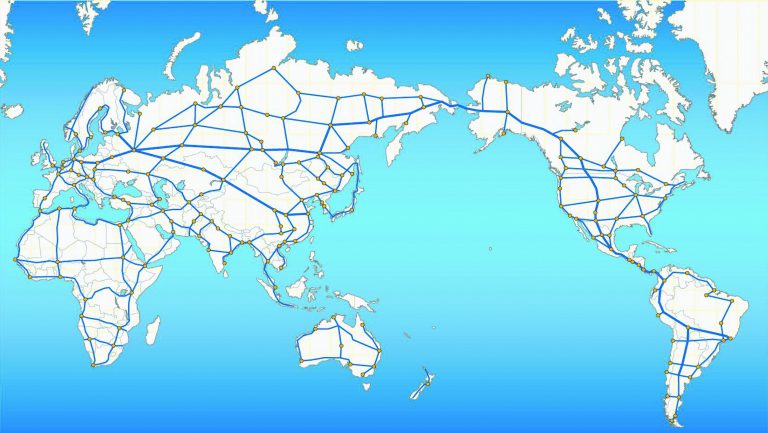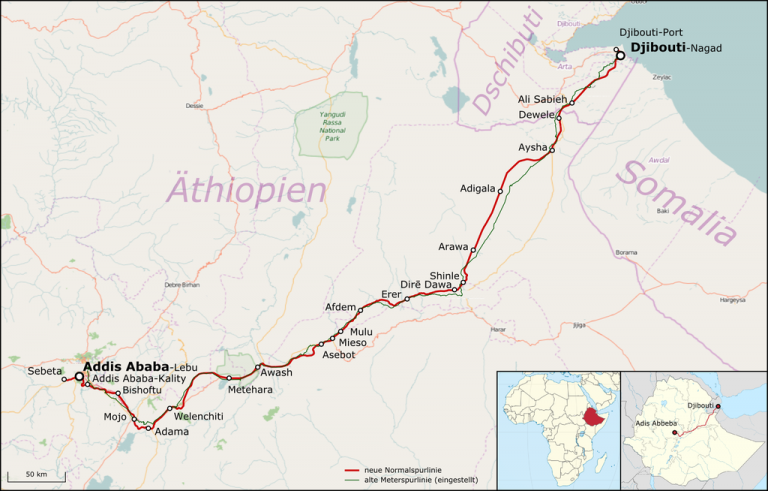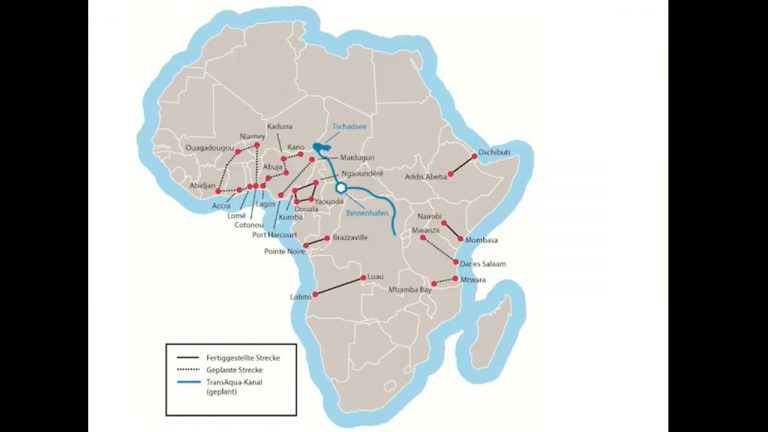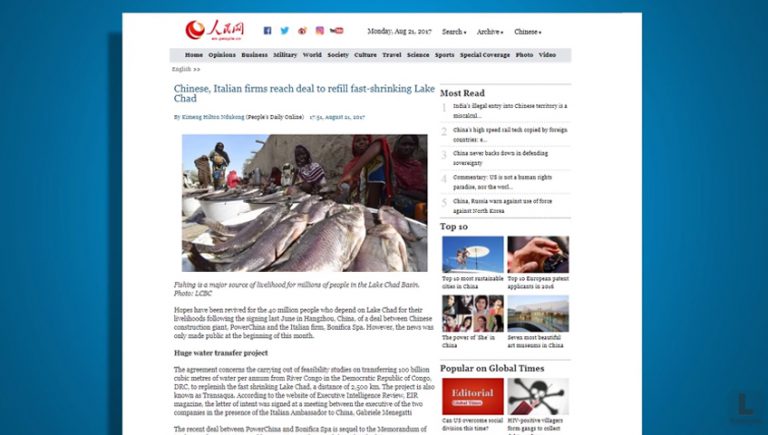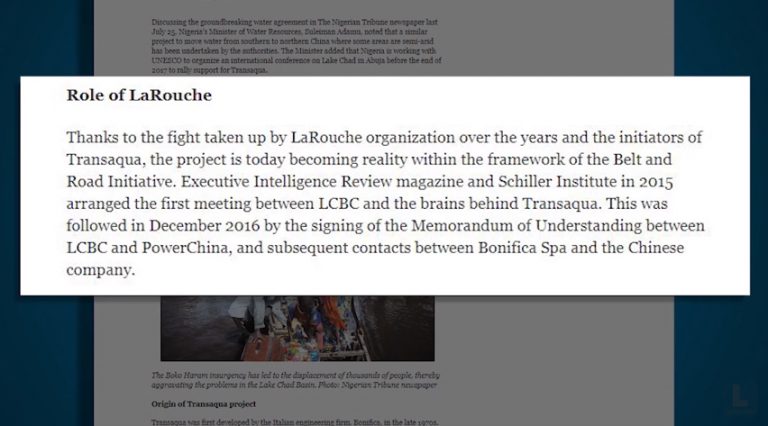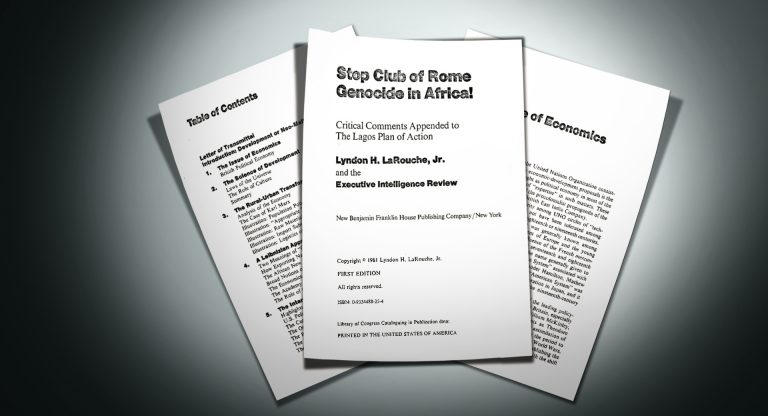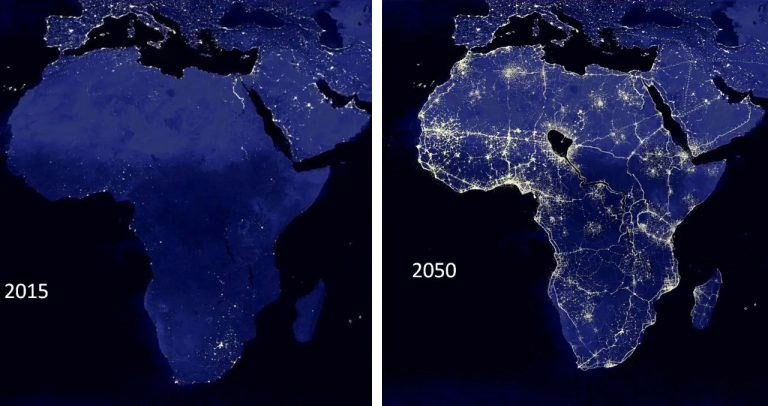PARIS, July 10 – Schiller Institute President Helga Zepp-LaRouche was invited on July 6 to address the Institut Mandela for the African Economic and Consular Days in Paris.
Madame Zepp-LaRouche was invited on the subject “Partnership, Inclusive Growth and Infrastructure in Africa” following the publication of her call to the European Union to apply the model of the Singapore summit between President Trump and Chairman Kim Jong-un to a European development project for Africa. Her appeal, “History Is Now Being Written in Asia! The EU Summit Must Follow the Example of Singapore!” has been being circulated in the African networks in France, as well as throughout Europe.
The video of her remarks is available HERE and the transcript is below.
The first panel presented the “Singapore spirit” with the participation of the Ambassador of Eritrea, speaking on the end of the war with Ethiopia and the economic perspective of the biggest free trade zone in Djibouti, for real cooperation in the region.
Following her presentation was Ghana’s Minister Plenipotentiary and Deputy Head of Mission Bonaventure Adjavor at the Paris Embassy, who developed the concept of a new era for Africa—a new era of manufacturing from raw materials, and no longer merely exporting them. He used the example of cocoa, of which Ghana and Ivory Coast have 80% of world production, all of which goes for export. But he described that cocoa can be a primary material for manufacturing many products, including brandy, body lotion, chocolate, etc., and that the policy of President Nana Addo Dankwa Akufo-Addo’s government is to do that.
President Akufo-Addo, then newly elected, is famous for his public lecture to visiting French President Emmanuel Macron during their joint press conference on Dec. 4, 2017, in which Akufo-Addo said Africa “can no longer continue to make policy for ourselves … on the basis of whatever support that the Western world or France, or the European Union can give us…. We have to get away from this mindset of dependency. … Our concern should be what do we need to do in this 21st century to move Africa away from being cap in hand … to have a mindset that says we can do it … and once we have that mindset we’ll see there’s a liberating factor for ourselves.”
Helga Zepp-LaRouche then spoke, defining the long-term perspective for Africa and the world, presenting the World Land-Bridge report and the physical project for Africa within the framework of the Belt and Road dynamic, as in Ethiopia with the high-speed train. She also presented the other projects the Schiller Institute has developed or promoted including the Transaqua project, and the extension of the World Land-Bridge into Africa via a tunnel between Spain and Morocco and/or between Sicily and Tunisia.
The audience was very challenged by the optimistic vision of Africa, as Mrs. Zepp-LaRouche showed the photograph of Africa from space at night, as it is now, and as it would be, all lit up, in 2050.
All 40 people in the room and on the panels were members of institutions, such as the International Organization of La Francophonie, and lawyers, entrepreneurs, public relations, etc.
The next speaker was the president of the Efficiency Club, formed by the Diaspora and first pan-African economic network of Europe. They are trying to stop the flow of remissions from the diaspora to Africa just to help their families survive. He developed the necessity to create a network of small and medium enterprises (SMEs) throughout the continent to provide jobs and not just subsistence on money.
Then a final panel was very interesting, with one of the panelists bringing in the economics of Alexander Hamilton, and how Africa has to go with this manufacturing economy. He also mentioned that Colbert had called Huygens and Cassini to France to develop a real science academy, and asserted that Africa has to do the same today. Many contacts were made … our time is now.
The Institut Mandela is dedicated to the strategic mission of Africa’s emergence as well as the “open society” values of peace through “intellectual diplomacy.” Its proposals are conveyed to public policymakers, the international community, private actors, and civil society, so that they can make visionary decisions. Its fundamental mission is to reorganize intellectually and institutionally the African countries.
The Institut’s activities revolve around six research areas:
Security and Development, Emergence of Africa, Geopolitics and Geostrategy of raw materials, Africanization of democracy, Prospects of African governance, Energy and Environment.
The Mandela Prizes are awarded annually to personalities or institutions to acknowledge their laudable actions in favor of Africa and peace, in the spirit of Pan-Africanism.
Transcript of Helga Zepp-LaRouche’s remarks:
Ladies and Gentlemen:
There is a profound reason for optimism for the African continent, because with the rise of China, and especially the New Paradigm which emerged with the Belt and Road Initiative, the world has been changing, especially in the last five years with an incredible speed. What China has done with the New Silk Road is to develop a new model of relations among each other, and it is an initiative which is open to all nations of the world.

So this map is actually a map of uniting all continents through tunnels and bridges, and as we can see, African development is an integral part of this world development.
What has happened is that with the offer to have a win-win cooperation, where according to the Chinese Foreign Minister Wang Yi, already 140 nations are participating, in various degrees, the spirit of the New Silk Road has actually captured the imagination of many countries in Africa, in Asia, and in Latin America, who see for the first time the concrete possibility to overcome poverty and underdevelopment in the short term.
In the last ten, but especially five years, what China has done is to create development potentials after centuries of colonialism and decades of IMF conditionalities, which were designed to prevent African and Third World development in general.
With this new change in the strategic situation there is the absolute perspective of turning Africa into a global powerhouse.
There has been a study published last November, that Africa is going to be the next factory of the world, and the Russian International Affairs Council, RIAC, just put out new figures showing the positive role of China in the development of Africa.
In 2000, the total trade between China and African states was $10 billion only. In 2014, the China was already Africa’s main trading partner, with a trade volume of $200 billion, and in 2017 China gave additional loans of more than $100 billion.

(Next) Naturally, this is the Djibouti-Addis Ababa railway, which was built with Chinese help; it’s 750km long, and it now allows also to bring food aid to areas which are hit by drought which was not possible before. And this is just the very beginning. China also has developed a China-Africa Development Fund, which is financed by the China Development Fund, and also many of the other state banks of China have been involved in direct investments. Over the last decade, China took part in the creation of more than 100 industrial zones, 40% of which are already operational. They have helped to build 5,756km of railway, 4335km of motorways, 9 ports, 14 airports, 34 power stations, 10 large and 1,000 small hydroelectric power stations, and by the end of 2016, it had this number.
This coming September, there will be a big China-African Union summit which obviously will take this relationship to a new level.
There is a fundamental change, because previously the Western countries refused to invest in a real way in Africa, but with the second largest economy of the world, there is now the chance for African nations to replicate the Chinese model of development, each in their own African way. But nevertheless, in terms of the infrastructure and industrial development they can take China as a model, which after all, in the last 40 years had an incredible transformation, from being a very, very underdeveloped country, to now being an absolutely breathtaking, dynamic economy.
This is the positive side. On the other side, we are confronted with unprecedented challenges: Terrorism, financial turbulence, migrants, and a large percentage of the 68.5 million refugees worldwide are migrating from Africa, trying to get through the Sahara, many of them dying of thirst; or drowning in the Mediterranean, where in the last years, thousands if not tens of thousands of people have drowned.
Since the refugee crisis escalated in Southwest Asia and Africa in 2015, it became very clear how deeply disunited the European Union is. And especially in the recent weeks there was a total government crisis in Germany, which nearly ended the political career of Chancellor Merkel. There was demonstrated a complete erosion of the EU: No unity, no solidarity, tensions between France and Italy, total tensions between Eastern Europe and Western Europe. And it is also very clear that they could not come up with any solution, because all they could propose at the recent EU summit was a complete brutalization of the migrant issue: They want to militarize Frontex, to supposedly keep the refugees out of the EU, which is sort of a maritime border police, and there were event proposals to use the German army or even NATO, to put the refugees into “disembarkment camps,” as they call them, either within Europe or in North African states, all of which already have rejected to be the hosts of such camps.
And Pope Francis has compared these camps to the concentration camps of the Nazi period.
So, what has happened to “Western values”? What about human rights? What about democracy? These are barbarian proposals, and they’re not only inhuman, but they also will not work. They will not work: They all the time talk about that one needs to look at the root causes for the refugee crisis, but they never do.
So, I have a proposal how this can be changed: I call it the “Singapore Summit model.” We all have witnessed the very historic summit between President Trump and President Kim Jong-un of North Korea recently in Singapore. And it is very clear that it {is} the New Silk Road Spirit which has changed the environment in Asia, which made this summit possible in the way it took place, and it is also an example of how you can change, within a few months, a relationship of complete adversity and the potential trigger of a large nuclear war, which was the situation between the United States and North Korea, and turn it into cooperation. This agreement now includes the denuclearization of North Korea, in exchange for the promise from the United States, China and Russia to help to develop North Korea economically, and turn it into a prosperous nation.
My proposal was that the EU should have changed the agenda of their just-concluded summit, invite Chinese President Xi Jinping, and the African heads of state who already have successfully cooperated with China; and then present a comprehensive crash program for the development of the infrastructure in Africa. (Next slide) Where the presence of Xi Jinping would give this credibility, because China has delivered on development, and the idea would be to present such an integrated, continental transport plan, a trans-African transport network, which already has been proposed by Foreign Minister Wang Yi in 2014, and reiterated in 2016.
If these leaders, the Europeans, the Africans, and the Chinese leader would say that it is our intent to make a crash program for such a development, then this would be a signal to the young people now running away, risking their life in drowning in the Mediterranean, or ending up in a concentration camp, to participate in the economic buildup of their own country.
At the recent visit of French President Macron in Ghana, Ghana’s President Nana Addo Dankwa Akufo-Addo basically told Macron that, we don’t need your development aid crumbs; what we need is a real investment. And he called on the youth that they should not try to get to Europe, but that this energy these young people have should be used to build up the country. This would require training centers, very much like what Franklin D.
Roosevelt did with the New Deal, the CCC program, training especially young people in the Civilian Conservation Corps; and then, such a summit, making such a declaration of intent, could be like the Singapore Summit, a complete turnaround.
I think we have to use, also, Xi Jinping’s notion of “sustainability.” Not to mean “appropriate technologies,” which in reality means no technology, and not sustainability which means only green solar and wind, but it means total infrastructure and industrialization as the new definition of sustainability.
African nations do not have to repeat all the levels and phases of the industrialization of the Western countries, but like China they can leapfrog to the most advanced technologies, such as focussing on high-speed trains, on magnetic levitation, on the fourth generation nuclear power. Party of this plan should be, first, a regional infrastructure investment bank, like the AIIB for Asia,— like an African Infrastructure Investment Bank—and that should be parallelled with national credit mechanisms, or national banks, to have the internal financing of the infrastructure.
Secondly, there should be an integrated network of high-speed trains, waterways between rivers and lakes, the full development of hydropower projects, the fourth general of nuclear electricity generation, and desalination of large amounts of ocean water for irrigation. Also, as the Ambassador of Ghana already said this morning, there should not be the export of raw materials, at least not only, but high-end petrochemical and metallurgy, semi-finished and finished products upgrade the value chain in the country.
In addition, there should be a Green Revolution, not in the sense of the Greenies of Europe, but in the sense of the Green Revolution of Jawaharlal Nehru, who transformed the agriculture of India in this way. You need disease- and drought-resistant plants, modern food-processing, and addition, you need certain large-scale projects, such as (next slide) the tunnel through the Strait of Gibraltar which is an eminently doable project, because a feasibility study has already been concluded; a state treaty between Spain and Morocco does exist, so one could start to build this immediately. Also, a bridge or a tunnel, as we see in the picture on my right, between Sicily and Tunisia, which could be built, with a couple of islands in between, and integrate the European development with that of Africa. And naturally, also a high-temperature reactor in South Africa should be promoted.

(Next slide) The biggest infrastructure project ever, in the history of Africa, is Transaqua. In February of this year, there took place a big conference in Abuja, with the presidents of all of the countries of the Lake Chad Basin, who concluded that the only way to save Lake Chad, which now has dried out to about 10% of its original size, and fill it up through the water from some of the tributaries of the Congo River, from a 500 meter height, and then, through gravitation, you could bring this water all the way to Lake Chad, and not only have an inland shipping lane for all the participating countries, hydropower, large amounts of water for irrigation and refill Lake Chad. This would transport up to 100 billion cubic meters of water annually, and as I said, Lake Chad would again have the size of 25 square km — now it’s only one-tenth of that. This has been adopted by this Abuja conference and then a treaty was concluded between PowerChina, which is a large, Chinese engineering firm — which is famous for having built the Three Gorges Dam, so they are very knowledgeable and experienced in making such big projects together with the Italian engineering firm Bonifica. The Italian government at that conference, announced that they are paying EU1.5 million to have a feasibility ready in one year; and this is also a perfect model for a tripartite cooperation among African nations, China, and in this case, a European nation, Italy.
This will be not a long-term project. The leading engineer of PowerChina announced at the conference that they are confident that they can finish this project in 12 years, and it will be an industrialization in the heart of Africa which can have complete transformational character.


(Next) People’s Daily already last August wrote an article about this, giving credit for this Transaqua project to the LaRouche movement and the Schiller Institute, because, we over the last three decades worked in many conference, advertising this to many people, and finally got the connection between PowerChina and Bonifica; and it’s now a state treaty between China and Italy. (Next) They emphasize in particular the role of our efforts in that.
This is, as I said, one of the results of our decades’ long work to help to industrialize Africa. (Next) This is a book which has a total plan for the industrialization of Africa which we already wrote in 1976, and this book was published in 1978.
So as you can see, this is not pouring from the heaven, but this movement, from the very beginning of the ideas of my husband, Lyndon LaRouche, stood for the industrial transformation of the southern hemisphere, simply because it’s the only way how you alleviate poverty, and create a good living standard for all the people.

(Next) In 1980, with the Lagos Plan of Action was published, my husband wrote a commentary to it, which already then was a very important conceptual approach how to tackle this problem of underdevelopment, by creating a continental infrastructure plan, new cities, science cities, and the education of the youth in particular. And we campaigned for this, for over really four decades;

(Next) The total work of this went into “The New Silk Road Becomes the World Land-Bridge,” which we published in 2014, after Xi Jinping announced the New Silk Road. And just about one week ago, we put out the World Land-Bridge report second edition, which has an updated plan for how to do this.
We conducted many conferences in Sudan, for the five countries around the Nile, how they could work together on development. And I also addressed an economic summit in Abuja in 1997.
In Europe we conducted many campaigns with the headline “The Future of Europe Lies in Africa.”
I think the application of the Singapore model is quite possible: Because the new Chancellor of Austria Sebastian Kurz, who is for one-half year the president of the European Union Council, has announced that he wants to conduct an EU-Africa summit before the end of the year. Now, Austria, while having a hard line on the migrants, on the other side, has in their coalition document of the two coalition parties in the government, a whole chapter that Austria wants to become the hub for the New Silk Road. And there are also many Central and Eastern European nations, Balkan nations, Southern European nations that all want to be the hub — for example, Spain and Portugal want to be not only the terminus of the Eurasian Silk Road towards the West, but they want to be the hub to the Portuguese- and Spanish-speaking countries around the world.
If they all cooperate on the New Silk Road this would be the way to do this, and since the refugee crisis will not go away, until you change, fundamentally, the policy towards an industrialization of Africa, I think this crisis can be turned into an chance. What the Schiller Institute is doing right now, and I would encourage all of you to help and do the same, is to have a full mobilization of all European nations and in Africa, which agree to actually put pressure on behalf of this perspective; and present the EU at this upcoming summit with the concrete outline of the necessary investments, with the participation of China, but also involve other countries, like India, Japan, even the United States, and do likewise. That if one approaches it like China — China builds a high-speed train, and I saw it with my own eyes, from Lanzhou to Urumqi in half a year — by doing it, by not simply building it one step after the other, but by starting to build it at 10 different places or even 20 different places. (Next slide) So if you had such a concrete plan you could start building it at many places at the same time.
We have outlined what projects could be in these two reports — we published one full report which is called “Extending the New Silk Road to West Asia and Africa,” which has many of these projects in it.

(Next slide) The left picture is, if you look at the electrification by night, this is how Africa is now. If one would go in the direction I just suggested, to extend the New Silk Road to Africa through a collaborative effort of all nations, then the African night sky could like the righthand picture, which is about equivalent of what you would see in the United States or Europe.
So, I think that this would turn Africa into a modern, prosperous continent, where all citizens would enjoy a safe, and happy and long life. So if we all act together in the spirit, Africa will be the new China with African characteristics.


















